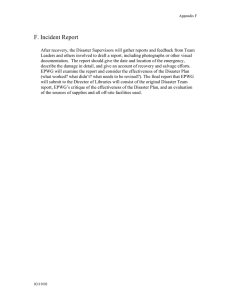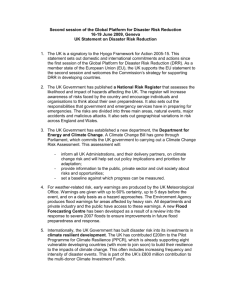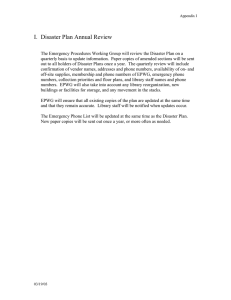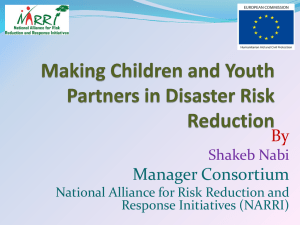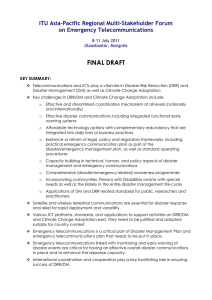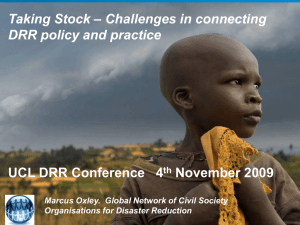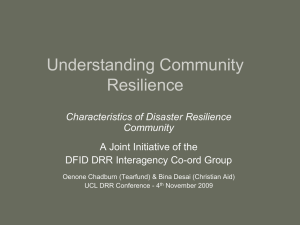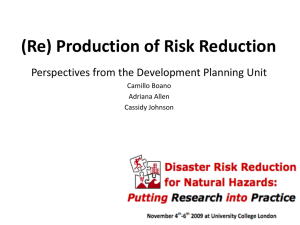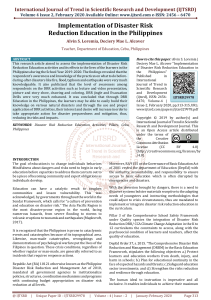Information and Knowledge Management A Risk Manager ’
advertisement
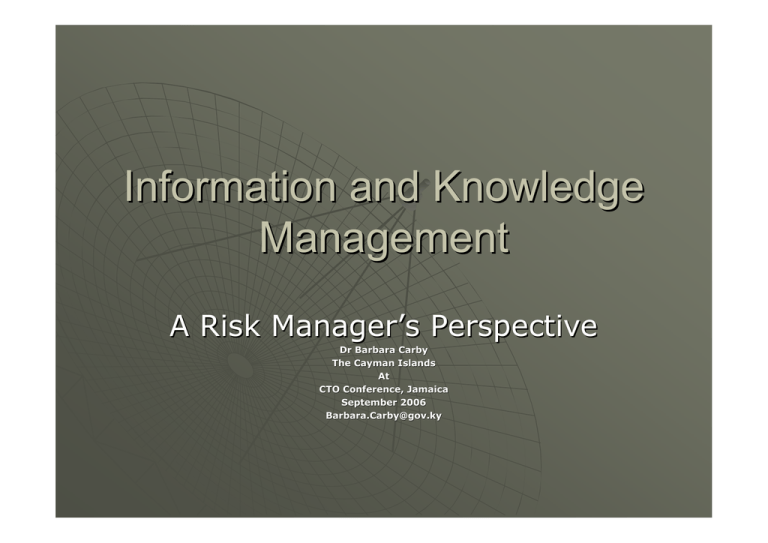
Information and Knowledge Management A Risk Manager’s Perspective Dr Barbara Carby The Cayman Islands At CTO Conference, Jamaica September 2006 Barbara.Carby@gov.ky Information and Knowledge A Risk Manager’s Perspective WHAT IS KNOWLEDGE MANAGEMENT? Information and Knowledge A Risk Manager’s Perspective WHAT IS KNOWLEDGE MANAGEMENT? The nonsense of 'knowledge management' T.D. Wilson Professor Emeritus University of Sheffield, UK Visiting Professor, Högskolan i Borås Borås, Sweden Information and Knowledge A Risk Manager’s Perspective “THE NONSENSE OF KNOWLEDGE MANAGEMENT” !!! Where !!!= consternation !!!!!! = Alarm !!!!!! Information and Knowledge A Risk Manager’s Perspective Professor Wilson’s review of literature showed that when ‘Knowledge Management’ was used ‘Information Management’ was described Information and Knowledge A Risk Manager’s Perspective WHAT IS KNOWLEDGE ? Information and Knowledge A Risk Manager’s Perspective The state or fact of knowing Logical but not enlightening Familiarity, awareness or understanding gained through experience Information and Knowledge A Risk Manager’s Perspective The sum or range of what has been perceived, discovered and/or learned Information and Knowledge A Risk Manager’s Perspective Knowledge must involve human information processing and resides in brain Information and Knowledge A Risk Manager’s Perspective Can knowledge be managed? Information and Knowledge A Risk Manager’s Perspective Disaster/Risk Managers must ensure that the public is aware, alerted. Usually means Giving Data and Information Information and Knowledge A Risk Manager’s Perspective Using Storm systems as example, warning usually starts as data gathered by “technology”, Gets translated to information (scientists ?) Information and Knowledge A Risk Manager’s Perspective Needs further translation to useful information Information and Knowledge A Risk Manager’s Perspective Transformation from data to useful information involves ‘Knowledge’ as previously defined Information and Knowledge A Risk Manager’s Perspective This transformation is critical for most appropriate and effective warning message to be given. Information and Knowledge A Risk Manager’s Perspective Data (Storm System) (weather stations, satellites, radar) 17N LAT, 76 W LONG Pressure 1004 millibars Forward speed 15 kmh Wind speed 60 kmh Information and Knowledge A Risk Manager’s Perspective That data useless to persons who have not been exposed to lat, long etc. Has to be changed into information Information and Knowledge A Risk Manager’s Perspective Storm is 100 miles (southwest of ) below Kingston Moving at a speed of x mph etc towards Rocky Point (Some persons do not understand Metric system) Information and Knowledge A Risk Manager’s Perspective Knowledge must now be added to give useful information Winds will start at 2:00pm Information and Knowledge A Risk Manager’s Perspective Strong enough to blow small cars off road, motorists using Smith Road should be careful as area known to have strong winds. Information and Knowledge A Risk Manager’s Perspective The Shore Road is like likely to be impassable by 5:00pm based on Projections etc. Leave now ! Information and Knowledge A Risk Manager’s Perspective Data, Information Processed By Human Brain which applies knowledge USEFUL INFORMATION Information and Knowledge A Risk Manager’s Perspective Knowledge allows same data to be adapted to various audiences applying appropriate communications technology Information and Knowledge A Risk Manager’s Perspective SAME DATA POLICY LEVEL President to address Nation (Mass media) OPERATIONS Pre-stage, open shelters (radio, cell phone, pagers, email) COMMUNITY Evacuate Mass media, radios, cell phones inc messages to multiple users POST-IMPACT Assessment - Satellite phones, GPS handsets, Information and Knowledge A Risk Manager’s Perspective OR SAME DATA – DO NOT GIVE ALERT AT SAME TIME Because the sum of what has been perceived, discovered or learnt i.e. knowledge, (mainly that public doesn’t like “false alarms”) means that future credibility must be factored into equation Information and Knowledge A Risk Manager’s Perspective Effective communication acknowledges validity of others’ knowledge Community too has ‘perceived, discovered and learnt’, therefore they too have knowledge which is to be applied. Disaster management officials must somehow integrate this knowledge into “official” systems Information and Knowledge A Risk Manager’s Perspective HOW CAN THE D/E/R MANAGEMENT COMMUNTY BENEFIT FROM KNOWLEDGE Since it cannot be “managed”? Information and Knowledge A Risk Manager’s Perspective LEADERSHIP MUST ENSURE EXPOSURE to new technology, data, information, experiences for RM staff, volunteers, community workers – leads to new knowledge RM - Risk Management Information and Knowledge A Risk Manager’s Perspective COMMUNICATION SHARE knowledge – must involve human interaction – workshops, e-discussion groups, scholarly and non-scholarly writing, use of cultural/popular mediainternet (regularly updated websites), cable television, music videos Information and Knowledge A Risk Manager’s Perspective COMMUNICATION Note: Use of web-based applications allows real-time management of any event from any location with multiple user inputs – Virtual EOC including video-conferencing Information and Knowledge A Risk Manager’s Perspective RESEARCH Gather data from a variety of sources – Physical/natural/social /behavioral sciences To help create new knowledge (or modified knowledge?) Information and Knowledge A Risk Manager’s Perspective ANALYSIS AND FEEDBACK Analyse events, interventions, programmes, exercises etc. and feedback to improve procedures, plans, ensure more efficient use of technology Information and Knowledge A Risk Manager’s Perspective Information and Communications Technology facilitates knowledge sharing – allows wider – global – reach of DRR message, allows manipulation of data to permit modelling of complex systems – and spatial displays of data (GIS) etc. DRR – Disaster Risk Reduction Information and Knowledge A Risk Manager’s Perspective SUMMARY ¾ ¾ Knowledge is built from data and information Requires integration of information and communications technology and brain technology to ensure successful disaster risk reduction Information and Knowledge A Risk Manager’s Perspective SUMMARY ¾ “Management” must involve sharing of : Information and Communications Technology Knowledge of technology and applications including most appropriate technology for circumstances Information and Knowledge A Risk Manager’s Perspective SUMMARY ¾ i) ii) It is the responsibility of DRR leadership to ensure that : Structures permitting sharing and exchange are developed and maintained necessarily includes application of available ICT New knowledge is created and applied DRRDRR- Disaster Risk Reduction


